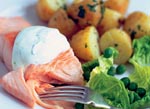The perfect poached salmon
Leslie Geddes-Brown explains how to prepare the perfect poached salmon


Taught to me by my mother-in-law and completely foolproof. Take the salmon, whether a piece or the whole fish, and let it lie flat in a pan in which it fits neatly (for a whole fish, you'll need a fish kettle). Add cold water until the salmon is just submerged, then a pinch of salt and, if you like, a glug of olive oil and white wine. Put the pan on a hot gas or electric or Aga hotplate until the water reaches a gentle boil.
Remove the pan and leave the fish to cool. By this time, it will be cooked. The magic is that the length of time it takes to reach the boil and then cool is in proportion to the weight of the fish. Serve, of course, with tiny, peeled new potatoes, a cucumber salad (I like just a spray of white-wine vinegar, no oil) with chopped chives and homemade mayonnaise. Not chic, not trendy, a cliché but delicious.
Exquisite houses, the beauty of Nature, and how to get the most from your life, straight to your inbox.
Country Life is unlike any other magazine: the only glossy weekly on the newsstand and the only magazine that has been guest-edited by His Majesty The King not once, but twice. It is a celebration of modern rural life and all its diverse joys and pleasures — that was first published in Queen Victoria's Diamond Jubilee year. Our eclectic mixture of witty and informative content — from the most up-to-date property news and commentary and a coveted glimpse inside some of the UK's best houses and gardens, to gardening, the arts and interior design, written by experts in their field — still cannot be found in print or online, anywhere else.
